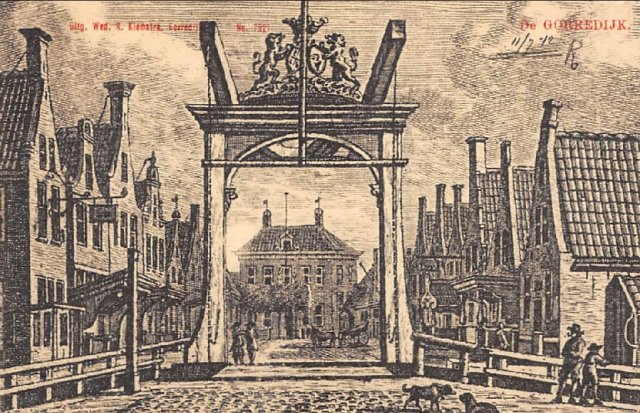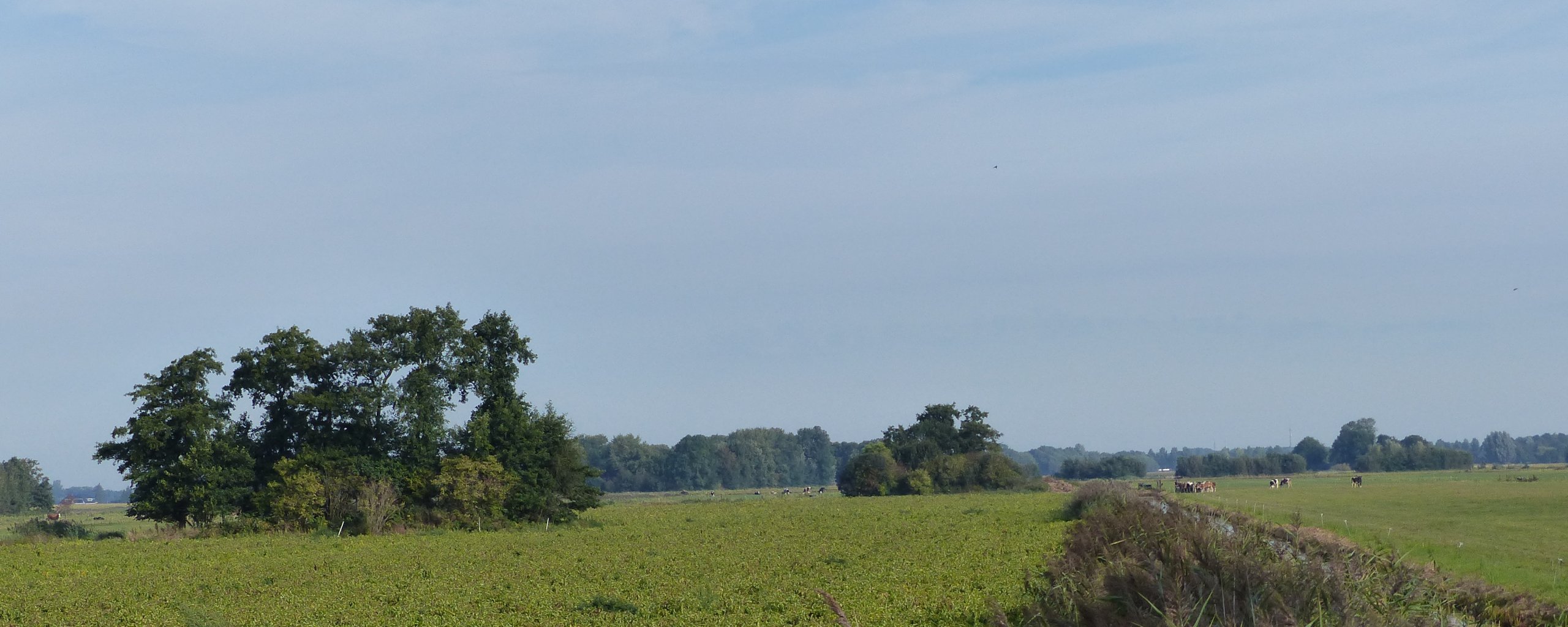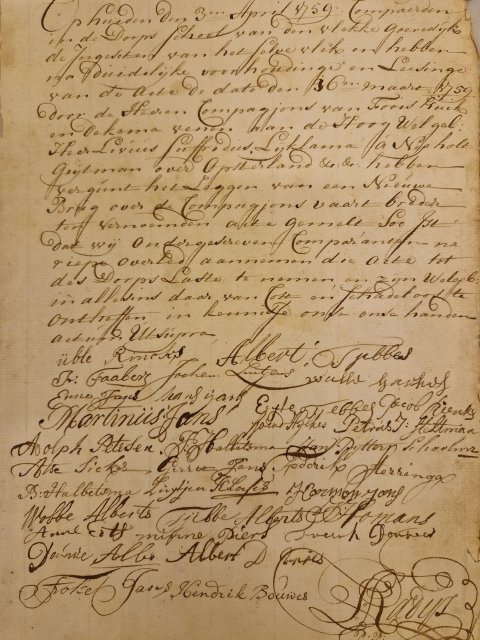
1759: Gorredijk gets a new bridge
Gorredijk is a "vlecke" (settlement with urban characteristics that is not a town) and originated from peat extraction and peat digging. Gorredijk was a central point for storing, importing and trading things. Much peat was transported. The digging of the Hegedyk around 1631 is considered the founding year of Gorredijk. A canal was then dug to the Gorrevenen. These Gorrevenen were excavated in the seventeenth century by the Lords Companions. Especially jonkheer Sytse van Dekema had many possessions here. To transport the peat, a canal was needed. We find the first mention of this in 1630. At the place where the canal crossed Hereweg, now Hegedyk and Hoofdstraat, a bridge and sluice were built: where the main bridge of Gorredijk now lies.

In 1759 we find a document in the archives that gives insight into the construction of a new bridge at this location. The inhabitants of Gorredijk then recorded that there was agreement to proceed with the construction and that the costs would be borne by the village itself. Grietman (mayor) Livius Suffrides Lijcklama à Nijeholt and thus also the grietenij (municipality), was exempted to contribute to the costs. At this time there was an annual market twice a year and a weekly market. At the weekly market there was a lot of trade in rye, buckwheat and other goods. Trade increased after a new bridge was built over the Compagnonsvaart in 1759. We know the bridge of 1759 from early topographical views: a monumental drawbridge with a driving deck over it. In 1862, the bridge was replaced again.
Variety
The document shows that the male inhabitants of Gorredijk met in the village school to come to an agreement for the construction of a new bridge. From some genealogical* sources and the 1749 quotisatiekohieren* at www.allefriezen.nl, the birth and death dates and occupations of most of the men mentioned in the document can be traced. It shows the diversity of the inhabitants and gives an insight into the composition of the Gorredijkers who lived there at that time. Present were among others silversmiths, a carpenter, miller, master linen weaver, the master baker, a glazier, merchants, peat bailiff and churchwarden, a rope maker, gortmaker, brewer, distiller, innkeeper, farmers, a surgeon and village judge, and the schoolmaster. They are listed at the bottom of the page in no particular order.
Content of the text
On this day the 3rd of April 1759, the inhabitants of the village school of the vlekke Goeredijk came together and after clear presentation and reading of the act of the dates the 16th of March 1759 by the Lords Compagjons of Foois Kuik and Dekema venen to the High Commonwealth. Mr. Livius Suffridus Lijklama á Nijeholt grijtman over Opsterland &: &: have granted the building of a New Bridge over the Compagnie canal mentioned more broadly in the above-mentioned act so we the undersigned Comparants after due deliberation agree to take this act as a burden for the village and to release his well-born in everything from cost and damages in our knowledge our hands actuen Utsupra.
Üble Rinecks, Albert Chibbes, J. Faaber, Jochem Luitjens, Wulle Gavhus, Enne Jans, Hans Jans, Eyte Tjebbes, Jacob Rienks, Martinüs Jans, Sjoerd Hylkes, Petrus J. Steltman, Adolph Petersen, H.J. Halbetsma, Jan Pijtters Schoolmr, Atze Sickes, Gerrit Jans, Frederikx Herringa, B: Halbetsma, Luytjen Klazes, Harman Jans, Wobbe Alberts, Tjibbe Alberts, J. Homans, Anne Eits, Minne Piers, Freerk Douwes, Douwe Alles, Albert D. Lippes, Foke Jans, Hendrik Bouwes.
The male residents of Gorredijk gathered in the village school:
- Minne (Menne) Piers (1732-1798)
- Anne Eits (Eyts) (.. - 1789) son of Eite/Eyte Tjebbes
- Eite Tjebbes (. _ ..) master carpenter and yserkramer
- Focke/Foke Jans (1743-1815) master linen weaver
- Jacob Rienks (Glass) (1723-1812) glazier
- Bartele Hiddes Halbetsma (1717-1784) master baker and merchant
- Jacobus Halbetsma (1722-1805) master silversmith
- Albert Tjibbes/Tjebbes (Hoogeveen) (1696-1767) merchant, carpenter, peat bog owner and church custodian Gorredijk
- Freerk Douwes (1723-1776) rope-maker and line-maker
- Oebele (Uble) Rinks (Rinx, Rinecks) (1716-1780)
- Jochum Luitjens (1708-1791) merchant at Gorredijk, born in Terhorne
- Jacobus Faber (1700-1765) brewer and farmer
- Enne Jans (1709-1763)
- Martinus Jans (...-...) master blacksmith
- Atze Sickes (Ferwerda) (1705-1774) miller Volder
- Sjoerd Hylkes (... - 1790) master groat maker
- Gerrit Jans (1709-1775)
- Hendrik Bouwes (1725 - ...)
- Wobbe Alberts (Hoogeveen/Hogeveen) (1724 - ...)
- Tjibbe Alberts (Hoogeveen/Hogeveen) (...-...)
- Jacobus Bernardus Homan (Homans) (1715-1771) surgeon
- Petrus Johannes Steltman (...-1763) silversmith and village judge. Lived in the Schansburg.
- Douwe Alles (Stoker) (1710-1762) master stoker and distiller
- Albert Lippes/Liepes (...-...)
- Jan Pijtters (...-... ) schoolmaster
- Adolph Johann Petersen (...-...) born in Mecklenburg, Germany
- Hans Jans ( ...- 1792) bog skipper and innkeeper
- Harmen Jans (Vledder) (1701-...)
- Luitjen Klazes/Klases (...-...)
- Frederikx Herringa
- Wulle Gavhus
Sources:
- J.J. Spahr van der Hoek and Joh. Frieswijk, De Vlecke Gorredyck (Leeuwarden 2000).
- The Heerenveen Courier, Oct. 24, 1947.
- www.gorredijk-historie.nl
- www.geneanet.org
- www.allefriezen.nl


